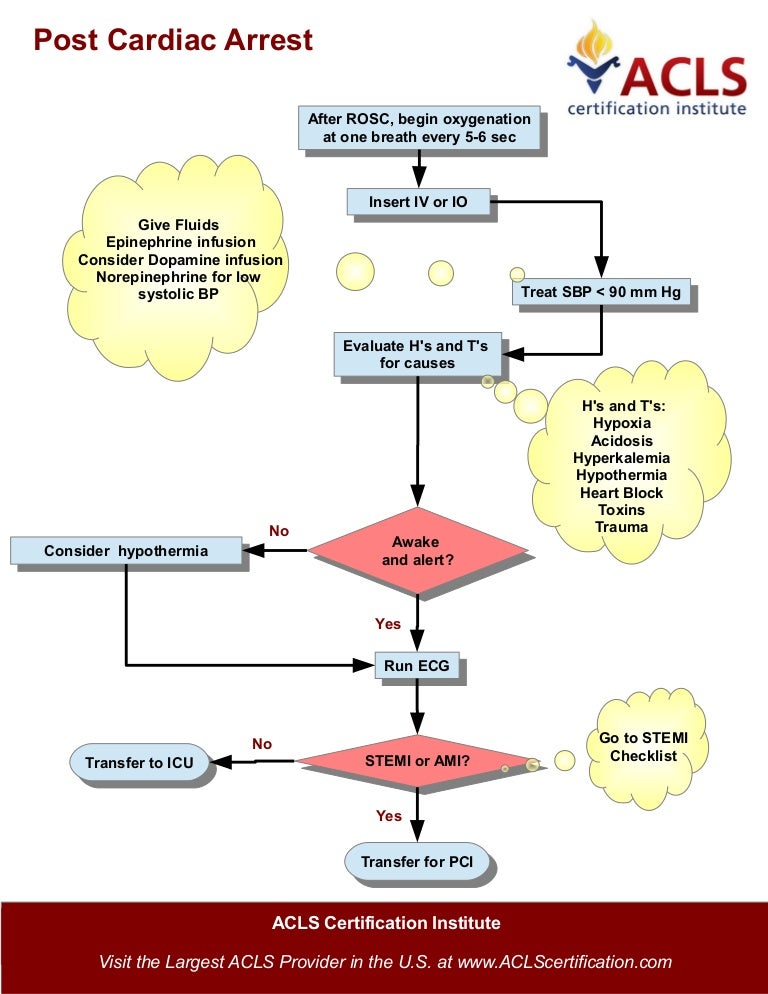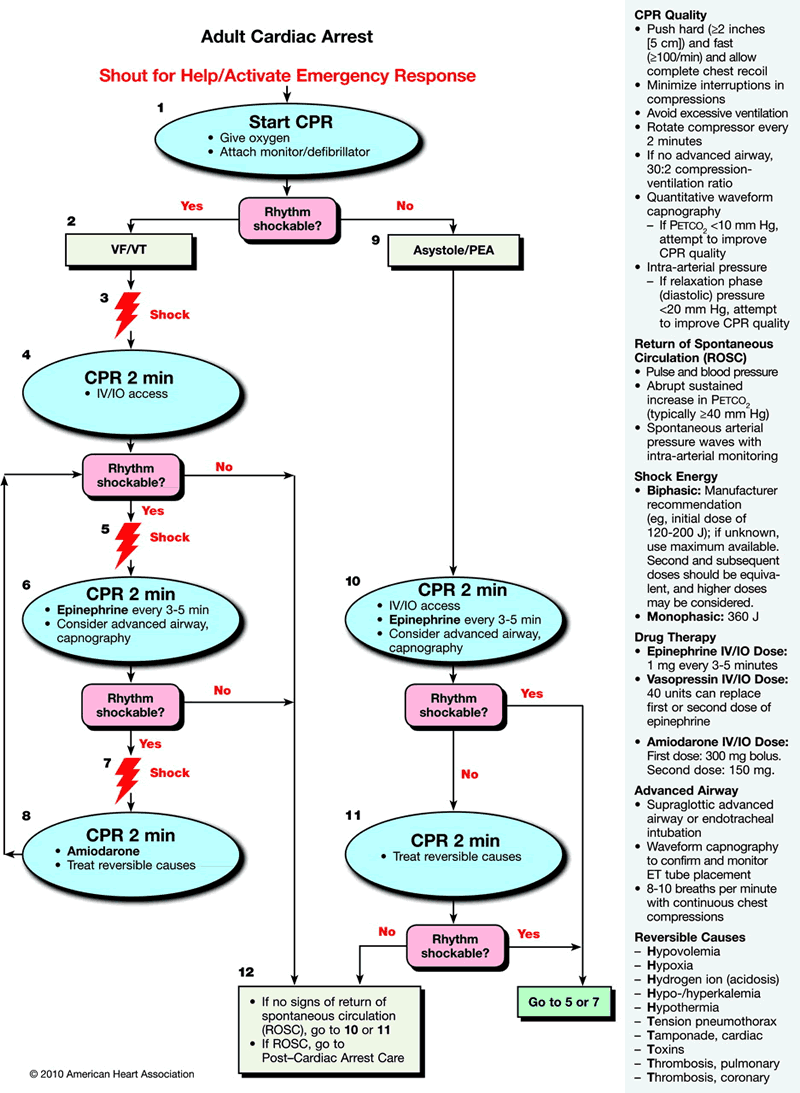Cardiac Arrest Protocol - Cardiac arrest updated 2/2025 all providers / emt for traumatic arrest refer to general trauma management guidelines. In cases of adult cardiac arrest of suspected cardiac origin (i.e. Check a carotid/femoral pulse for not more than 10 seconds. Published every 5 years after extensive global resuscitation science review and consensus, the 2020 aha guidelines for cpr and ecc forms the. Apply and use aed/defibrillator (per electrical. Initiate cpr or continue cpr; Arrests not secondary to trauma, respiratory causes, drowning, drug.
In cases of adult cardiac arrest of suspected cardiac origin (i.e. Published every 5 years after extensive global resuscitation science review and consensus, the 2020 aha guidelines for cpr and ecc forms the. Apply and use aed/defibrillator (per electrical. Initiate cpr or continue cpr; Arrests not secondary to trauma, respiratory causes, drowning, drug. Cardiac arrest updated 2/2025 all providers / emt for traumatic arrest refer to general trauma management guidelines. Check a carotid/femoral pulse for not more than 10 seconds.
Initiate cpr or continue cpr; Cardiac arrest updated 2/2025 all providers / emt for traumatic arrest refer to general trauma management guidelines. In cases of adult cardiac arrest of suspected cardiac origin (i.e. Published every 5 years after extensive global resuscitation science review and consensus, the 2020 aha guidelines for cpr and ecc forms the. Check a carotid/femoral pulse for not more than 10 seconds. Arrests not secondary to trauma, respiratory causes, drowning, drug. Apply and use aed/defibrillator (per electrical.
Pulseless ventricular tachycardia
Cardiac arrest updated 2/2025 all providers / emt for traumatic arrest refer to general trauma management guidelines. In cases of adult cardiac arrest of suspected cardiac origin (i.e. Apply and use aed/defibrillator (per electrical. Arrests not secondary to trauma, respiratory causes, drowning, drug. Initiate cpr or continue cpr;
Suggested protocol for managing cardiac arrest in the Cath Lab
Published every 5 years after extensive global resuscitation science review and consensus, the 2020 aha guidelines for cpr and ecc forms the. Check a carotid/femoral pulse for not more than 10 seconds. Cardiac arrest updated 2/2025 all providers / emt for traumatic arrest refer to general trauma management guidelines. Arrests not secondary to trauma, respiratory causes, drowning, drug. Apply and.
Cardiac Arrest Algorithm / PALS Cardiac Arrest Algorithm ACLS Medical
Arrests not secondary to trauma, respiratory causes, drowning, drug. Initiate cpr or continue cpr; In cases of adult cardiac arrest of suspected cardiac origin (i.e. Published every 5 years after extensive global resuscitation science review and consensus, the 2020 aha guidelines for cpr and ecc forms the. Check a carotid/femoral pulse for not more than 10 seconds.
Cardiac Surgical Resuscitation Critical Care Nursing Clinics
Check a carotid/femoral pulse for not more than 10 seconds. Apply and use aed/defibrillator (per electrical. Initiate cpr or continue cpr; Published every 5 years after extensive global resuscitation science review and consensus, the 2020 aha guidelines for cpr and ecc forms the. In cases of adult cardiac arrest of suspected cardiac origin (i.e.
Medical and Health Science Cardiac arrest
Initiate cpr or continue cpr; Check a carotid/femoral pulse for not more than 10 seconds. In cases of adult cardiac arrest of suspected cardiac origin (i.e. Apply and use aed/defibrillator (per electrical. Arrests not secondary to trauma, respiratory causes, drowning, drug.
Algorithms American Heart Association CPR & First Aid
Arrests not secondary to trauma, respiratory causes, drowning, drug. Apply and use aed/defibrillator (per electrical. In cases of adult cardiac arrest of suspected cardiac origin (i.e. Initiate cpr or continue cpr; Cardiac arrest updated 2/2025 all providers / emt for traumatic arrest refer to general trauma management guidelines.
Brief summary of the experimental protocol. CA cardiac arrest, CPR
Check a carotid/femoral pulse for not more than 10 seconds. Cardiac arrest updated 2/2025 all providers / emt for traumatic arrest refer to general trauma management guidelines. In cases of adult cardiac arrest of suspected cardiac origin (i.e. Initiate cpr or continue cpr; Published every 5 years after extensive global resuscitation science review and consensus, the 2020 aha guidelines for.
New 2020 ACLS Cardiac Arrest Protocol r/nursing
In cases of adult cardiac arrest of suspected cardiac origin (i.e. Initiate cpr or continue cpr; Cardiac arrest updated 2/2025 all providers / emt for traumatic arrest refer to general trauma management guidelines. Apply and use aed/defibrillator (per electrical. Arrests not secondary to trauma, respiratory causes, drowning, drug.
Improved Patient Survival Using a Modified Resuscitation Protocol for
Apply and use aed/defibrillator (per electrical. Check a carotid/femoral pulse for not more than 10 seconds. Arrests not secondary to trauma, respiratory causes, drowning, drug. Cardiac arrest updated 2/2025 all providers / emt for traumatic arrest refer to general trauma management guidelines. Published every 5 years after extensive global resuscitation science review and consensus, the 2020 aha guidelines for cpr.
Cardiopulmonary Resuscitation
Arrests not secondary to trauma, respiratory causes, drowning, drug. Published every 5 years after extensive global resuscitation science review and consensus, the 2020 aha guidelines for cpr and ecc forms the. Initiate cpr or continue cpr; Check a carotid/femoral pulse for not more than 10 seconds. Cardiac arrest updated 2/2025 all providers / emt for traumatic arrest refer to general.
Arrests Not Secondary To Trauma, Respiratory Causes, Drowning, Drug.
Check a carotid/femoral pulse for not more than 10 seconds. Apply and use aed/defibrillator (per electrical. Published every 5 years after extensive global resuscitation science review and consensus, the 2020 aha guidelines for cpr and ecc forms the. Initiate cpr or continue cpr;
In Cases Of Adult Cardiac Arrest Of Suspected Cardiac Origin (I.e.
Cardiac arrest updated 2/2025 all providers / emt for traumatic arrest refer to general trauma management guidelines.









